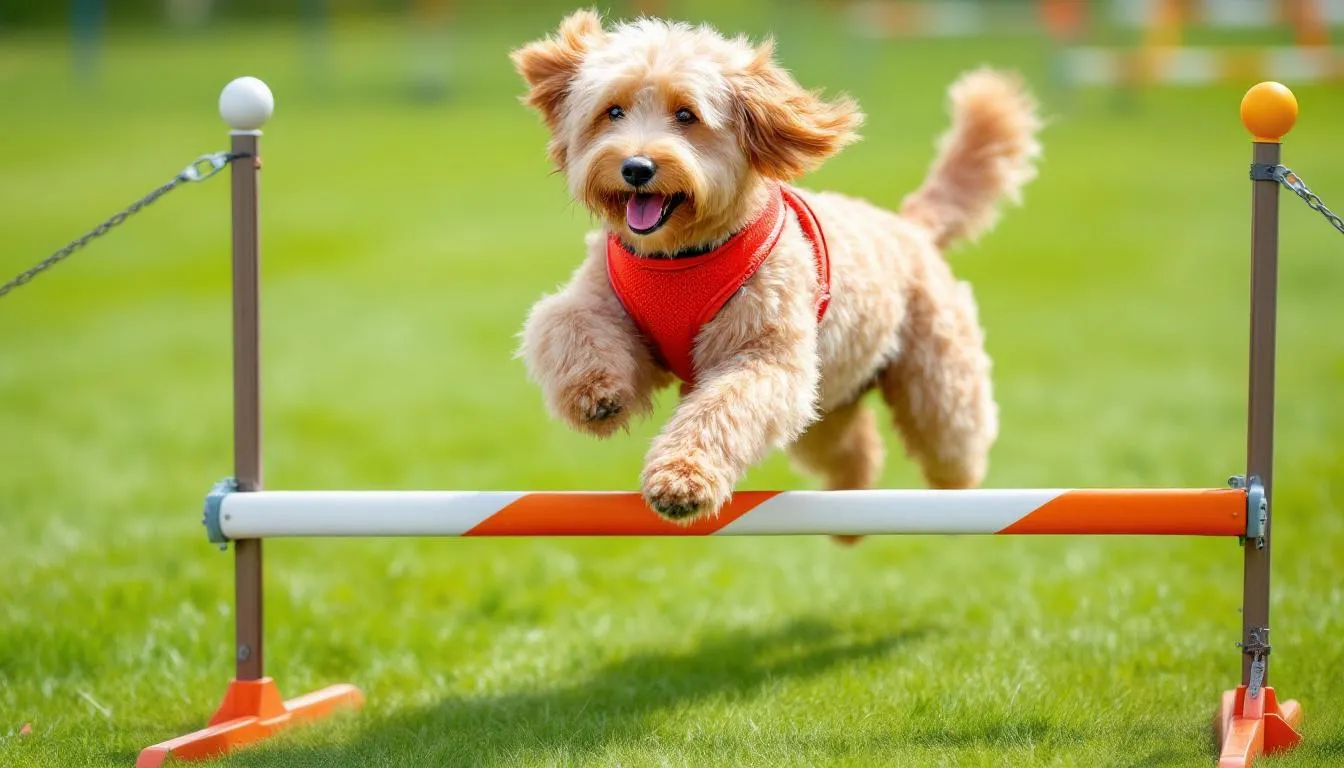Introduction to Goldendoodles
Goldendoodles are a beloved hybrid crossbreed, combining the best qualities of Golden Retrievers and Poodles. Renowned for their friendly nature and affectionate behavior, Goldendoodles have quickly become one of the smartest dog breeds and a top choice for families seeking a loyal companion. Their high intelligence and highly trainable personalities make them a joy to teach, whether you’re working on basic commands or advanced tricks. Goldendoodles thrive in active families, enjoying playtime, regular exercise, and plenty of human interaction. Thanks to their low shedding coats and hypoallergenic qualities, they’re also a great option for people with allergies. Whether you’re an experienced dog owner or welcoming your first pup, Goldendoodles are perfect companions who bring warmth, fun, and intelligence into any home.
Key Takeaways
- Goldendoodles inherit exceptional intelligence from both golden retrievers (ranked 4th) and poodles (ranked 2nd) in Stanley Coren’s intelligence rankings
- They excel in three types of intelligence: instinctive, adaptive, and working intelligence, making them highly trainable companions
- Their emotional intelligence and communication skills allow them to read human emotions and respond appropriately to different situations
- Their higher intelligence enhances their ability to understand and respond to human emotions, leading to stronger emotional bonds and increased loyalty
- Goldendoodles are commonly used as service dogs due to their quick learning ability, problem-solving skills, and calm temperament
- Their intelligence requires mental stimulation and consistent training to prevent behavioral issues and keep them engaged
Goldendoodles inherit exceptional intelligence from both golden retrievers (ranked 4th) and poodles (ranked 2nd) in Stanley Coren’s intelligence rankings
They excel in three types of intelligence: instinctive, adaptive, and working intelligence, making them highly trainable companions
Their emotional intelligence and communication skills allow them to read human emotions and respond appropriately to different situations
Their higher intelligence enhances their ability to understand and respond to human emotions, leading to stronger emotional bonds and increased loyalty
Goldendoodles are commonly used as service dogs due to their quick learning ability, problem-solving skills, and calm temperament
Their intelligence requires mental stimulation and consistent training to prevent behavioral issues and keep them engaged


Are Goldendoodles Smart? The Intelligence Behind the Breed
If you’re wondering whether goldendoodles are smart, the short answer is a resounding yes. These popular hybrid crossbreed dogs consistently rank among the smartest dog breeds available today, and there’s solid science behind this reputation.
Goldendoodles inherit their remarkable intelligence from two of the world’s most intelligent dog breeds. According to Dr. Stanley Coren’s landmark research on canine intelligence, poodles rank as the second smartest breed, while golden retrievers hold the fourth position. When you combine the genetic material from these purebred parents, you get a dog with exceptional cognitive abilities.
The concept of hybrid vigor also plays a role in goldendoodle intelligence. This phenomenon suggests that crossbreeds can sometimes exhibit enhanced traits compared to their parent breeds. While comprehensive long-term studies are still ongoing, many experts report that goldendoodles may even exceed golden retrievers in certain working and obedience tasks. Goldendoodles belong to the broader doodle category, which includes other popular doodle breeds like Labradoodles; each doodle breed has its own unique origins and characteristics, but Goldendoodles are especially prized for their intelligence and friendly temperament.
What makes this particularly impressive is that goldendoodles were originally developed in the 1990s with intelligence as a primary breeding goal. Breeders wanted to create the perfect guide dog that combined the poodle’s problem-solving abilities with the golden retriever’s gentle, eager-to-please nature. Choosing a responsible breeder is crucial, as reputable breeders ensure the puppy’s intelligence, health, and temperament through careful lineage verification and health testing protocols.
Goldendoodle Varieties
Goldendoodles come in several size varieties, each offering its own unique charm while sharing the breed’s hallmark traits. Standard Goldendoodles are the result of crossing a Golden Retriever with a Standard Poodle, producing a larger dog with a gentle, affectionate temperament. Mini Goldendoodles, created by pairing a Golden Retriever with a Miniature Poodle, are a popular choice for those seeking a smaller, yet equally intelligent and loving companion. Toy Goldendoodles, bred from Golden Retrievers and Toy Poodles, offer a petite size perfect for smaller living spaces. Regardless of size, all Goldendoodles are known for their intelligence, playful personalities, and affectionate nature. With proper training and socialization, Goldendoodles excel in obedience training, agility, and even as service dogs, making them great family dogs for households of all shapes and sizes.
The Three Types of Intelligence in Goldendoodles
Animal psychologists recognize three distinct categories of canine intelligence, and goldendoodles excel in all three areas. Understanding these categories helps explain why goldendoodle owners consistently report such positive training experiences. A dog's ability to perform instinctive, adaptive, and working tasks is a key factor in their overall intelligence.
Instinctive Intelligence
Instinctive intelligence refers to the natural abilities dogs inherit based on their breed’s historical purpose. Goldendoodles benefit from the combined instincts of both parent breeds, creating a remarkably well-rounded companion.
From their golden retriever heritage, goldendoodle puppies naturally display strong retrieving instincts. Even untrained pups will often pick up objects and carry them around, showing an innate understanding of fetching behaviors. Their swimming abilities and water confidence come from both parent breeds, making them excellent companions for active families who enjoy water activities.
Many goldendoodle owners notice gentle herding behaviors around family members, especially children. This protective instinct helps make them great family dogs while demonstrating their natural awareness of social dynamics within their human family.
Adaptive Intelligence
Adaptive intelligence measures a dog’s ability to solve problems and learn from experience in novel situations. This is where goldendoodles truly shine, often surprising their owners with creative problem-solving skills.
These intelligent dogs quickly learn daily routines and can predict owner activities with uncanny ability. They’ll recognize when you’re getting ready for work (grabbing keys and shoes), preparing for a walk (reaching for the leash), or settling in for the evening. This pattern recognition helps them adapt seamlessly to household schedules.
Environmental awareness is another strength. Goldendoodles navigate new spaces confidently and can figure out how to open doors, find hidden treats, or manipulate puzzle toys. Their curiosity drives them to explore and understand their surroundings, making them highly adaptable to different living situations.
Working Intelligence
Working intelligence focuses on a dog’s ability to learn from humans and follow commands. This is perhaps the most practical aspect of intelligence for most goldendoodle owners, and it’s where these dogs truly excel.
Most goldendoodles can learn new commands in just 5-15 repetitions, compared to 25-40 repetitions required by average dogs. They can understand up to 150 words or commands, similar to the mental capacity of a 2 to 2.5-year-old human child. This rapid learning ability makes basic obedience training remarkably straightforward.
The retention of learned behaviors is equally impressive. Goldendoodles remember commands and tricks even after extended periods without practice. Their eagerness to please, inherited from both parent breeds, means they’re genuinely motivated to learn and perform correctly. Because they are highly intelligent and responsive to positive reinforcement, Goldendoodles can be quickly trained for a variety of tasks, including obedience, agility, and even service work.


Communication and Emotional Intelligence
Beyond traditional measures of intelligence, goldendoodles possess exceptional emotional and communication skills that set them apart from many other breeds. This emotional intelligence makes them particularly effective as therapy animals and beloved family companions.
Goldendoodles develop sophisticated ways to communicate their needs. Many learn to ring bells for potty breaks, nudge their owners for attention, or use specific vocalizations for different requests. Goldendoodles may also bark to communicate specific needs or emotions, using their bark as another way to express themselves to their owners. This clear communication reduces frustration for both dog and owner.
Their ability to read human emotions is remarkable. Studies on goldendoodle emotional intelligence show they outperform many breeds in accurately identifying and responding to human feelings. They sense when family members are upset and often provide comfort without being asked.
This emotional acuity extends to their interactions with different people. Goldendoodles naturally adjust their energy level and play style when interacting with children versus adults, elderly family members, or strangers. This adaptability makes them perfect companions for households with varying needs.
Health Considerations
While Goldendoodles are generally healthy dogs, it’s important for owners to be aware of potential health problems that can affect the breed. Common concerns include hip dysplasia, heart disease, and certain eye conditions. To help ensure a healthy start, reputable breeders perform thorough health screenings on parent dogs before breeding, reducing the risk of inherited issues. Regular veterinary check-ups, a balanced diet, and appropriate exercise are essential for maintaining your Goldendoodle’s well-being. By staying informed and working with responsible breeders, parents can help their Goldendoodles lead long, happy, and healthy lives.
Goldendoodles as Service Dogs
The intelligence and temperament that make goldendoodles excellent family pets also qualify them for demanding service dog roles. Their success in these programs provides concrete evidence of their exceptional cognitive abilities.
Service dog work requires a unique combination of high intelligence, emotional stability, and quick learning ability. Goldendoodles excel in all these areas, making them suitable for various service tasks including guide work for the blind, mobility assistance, medical alert duties, and psychiatric support roles.
The training timeline for service dog preparation typically takes 18-24 months, and goldendoodles often progress faster than average through these rigorous programs. Their ability to learn complex multi-step tasks, remain calm in stressful situations, and maintain focus on their handler’s needs demonstrates their superior intelligence.
Success rates for goldendoodles in service dog programs consistently exceed those of many traditional breeds. Their combination of intelligence, affectionate nature, and adaptability makes them ideal candidates for these life-changing roles.


Training Your Goldendoodle: Tips for Success
The high intelligence of goldendoodles makes training both easier and more important. These smart dogs need consistent mental challenges to stay happy and well-behaved.
Start training early, ideally when your goldendoodle puppy is 8 weeks old. Their rapid learning ability means they’ll pick up both good and bad habits quickly, so establishing positive patterns from the beginning is crucial.
Positive reinforcement works exceptionally well with goldendoodles. Their eagerness to please means they respond enthusiastically to praise, treats, and play rewards. Focus on basic commands first: sit, stay, come, down, and leave it. These fundamental skills form the foundation for more advanced training.
Consistency is key with these intelligent dogs. They’ll quickly notice if rules change or if different family members have different expectations. Keep training sessions short but frequent – 5-10 minutes several times daily works better than one long session.
Mental stimulation activities should be part of every goldendoodle’s routine. Puzzle toys, agility training, scent work, and competitive dog sports all provide excellent outlets for their intelligence. Many goldendoodles enjoy learning new tricks and can master impressive repertoires of commands.
The Benefits of Owning a Smart Dog
Living with a highly intelligent dog like a goldendoodle brings numerous advantages that enhance the human-animal bond and make daily life more enjoyable. Like other doodles, Goldendoodles are known for their intelligence, trainability, and playful nature, making them quick learners and highly social companions.
The training process becomes significantly easier when working with intelligent dogs. Fewer repetitions are needed to teach new behaviors, and goldendoodles often seem to anticipate what you want them to learn. This efficiency reduces frustration and accelerates the timeline for achieving training goals.
Enhanced communication develops naturally with smart dogs. Goldendoodles learn to express their needs clearly and understand subtle human cues. This two-way communication creates stronger emotional bonds and reduces misunderstandings that can lead to behavioral issues.
The adaptability of intelligent dogs makes them excellent companions for changing lifestyles. Whether you move to a new home, welcome a new family member, or change your daily routine, goldendoodles adjust quickly and maintain their calm, friendly nature.


Intelligence Requirements and Mental Stimulation
The flip side of owning such an intelligent dog is the responsibility to keep their minds engaged. Goldendoodles require 30-60 minutes of mental stimulation daily, in addition to their regular exercise needs. Physical exercise, such as daily walks, runs, hikes, or playtime, is essential for meeting their energy requirements and maintaining their overall health and happiness.
Under-stimulated goldendoodles often develop behavioral issues including destructive chewing, excessive barking, digging, or separation anxiety. These problems aren’t signs of a “bad” dog – they’re indicators that a brilliant mind needs more challenges.
Interactive toys that dispense treats, rotating puzzle games, and training sessions all count toward daily mental exercise. Even simple activities like practicing commands during meal preparation or playing hide-and-seek can provide valuable mental stimulation.
Socialization plays a crucial role in cognitive development. Exposing your goldendoodle to various people, animals, environments, and situations helps develop their problem-solving abilities and emotional intelligence. Well-socialized goldendoodles become more confident and adaptable throughout their lives.
Comparison to Other Dog Breeds
Goldendoodles are often compared to other popular dog breeds, especially Labradoodles, which are a cross between a Labrador Retriever and a Poodle. While both breeds are intelligent and friendly, Goldendoodles typically have a calmer energy level and may enjoy a longer lifespan than Labradoodles. When compared to their parent breeds—Poodles and Golden Retrievers—Goldendoodles offer a unique combination of traits, blending the Poodle’s intelligence and hypoallergenic coat with the Golden Retriever’s affectionate and easygoing nature. While other breeds like Poodles, Golden Retrievers, and Labradoodles each have their own appeal, Goldendoodles stand out for their balanced temperament, adaptability, and the special combination that makes them such highly desirable family pets.
FAQ
How does a goldendoodle’s intelligence compare to other popular breeds?
Goldendoodles rank among the top 10% of dog breeds for intelligence, surpassing breeds like Beagles, Bulldogs, and most terriers. While they may not quite match the specialized intelligence of Border Collies or their poodle parent, they consistently outperform most other breeds in working and obedience intelligence. Their balanced combination of problem-solving skills and emotional intelligence makes them exceptionally well-rounded companions compared to other dogs. When compared to the Labradoodle, Goldendoodles are often described as slightly more easygoing and affectionate, while Labradoodles may have a longer lifespan and a bit more energy.
At what age do goldendoodles show their full intelligence potential?
Goldendoodle puppies begin showing intelligence signs as early as 8-12 weeks old, often learning their names and basic commands remarkably quickly. However, their full cognitive abilities typically develop by 12-18 months of age. Unlike some breeds that plateau early, goldendoodles continue learning throughout their 10-15 year lifespan, often becoming more intuitive and responsive to their owners’ needs as they mature.
Can a goldendoodle’s intelligence vary based on which parent they take after more?
Yes, F1 goldendoodles that inherit more poodle traits may show slightly higher problem-solving abilities and independence in learning. Those favoring golden retriever genetics might excel more in emotional intelligence and eagerness to please, making them super easy to train through positive reinforcement. Reputable breeders often can predict which traits will be more prominent based on the specific poodle and golden retriever bloodlines used.
Do mini goldendoodles have the same intelligence as standard-sized ones?
Mini goldendoodles possess the same intelligence potential as their standard-sized counterparts since they inherit from the same parent breeds. The size difference comes from using standard poodles versus miniature poodles in breeding, but both poodle varieties rank equally high in intelligence. The smaller size might make some physical tasks more challenging, but their cognitive abilities, trainability, and emotional intelligence remain just as impressive.
What happens if I don’t provide enough mental stimulation for my intelligent goldendoodle?
Under-stimulated goldendoodles often develop problematic behaviors as outlets for their unused mental energy. Common issues include destructive chewing of furniture or belongings, excessive barking at minor triggers, digging in yards or gardens, and separation anxiety when left alone. These behaviors typically resolve quickly once owners increase mental stimulation through training, puzzle toys, and interactive games. The key is recognizing that behavioral issues in intelligent dogs usually stem from boredom rather than defiance.
Are Goldendoodles good with kids and cats?
Goldendoodles are known for their friendly and gentle nature, making them excellent companions for kids and families. They generally get along well with cats and other household pets, though some initial adjustment and supervision may be needed to ensure a smooth introduction.
How much grooming do Goldendoodles need?
Goldendoodles have a high-maintenance coat that requires regular grooming. This includes frequent brushing to prevent matting, regular bathing, and professional grooming appointments every four to eight weeks. Training your Goldendoodle for proper grooming habits from a young age is important to keep their coat healthy and to prevent issues like ear infections and eye problems.
Do Goldendoodles shed?
Goldendoodles are considered low-shedding dogs and are often described as hypoallergenic, making them a good choice for allergy sufferers. While they shed very little, regular grooming is essential to maintain their coat quality and minimize any loose hair.
What should a Goldendoodle owner consider before getting one?
A Goldendoodle owner should consider the breed’s need for regular grooming, daily exercise, and mental stimulation. It’s important to find a reputable breeder and to understand the dog’s personality traits and adaptability to ensure a good fit for your household.
Conclusion Goldendoodles: Are they the right pet for you?
In conclusion, Goldendoodles are intelligent, friendly, and adaptable dogs that make wonderful family pets, especially for homes with kids and other pets like cats. However, potential owners should be prepared for the responsibilities of regular grooming, ongoing training, and providing plenty of mental and physical stimulation. If you are a committed Goldendoodle owner willing to meet these needs, this breed can be a loving and rewarding companion.
FAQ
How does a goldendoodle’s intelligence compare to other popular breeds?
Goldendoodles rank among the top 10% of dog breeds for intelligence, surpassing breeds like Beagles, Bulldogs, and most terriers. While they may not quite match the specialized intelligence of Border Collies or their poodle parent, they consistently outperform most other breeds in working and obedience intelligence. Their balanced combination of problem-solving skills and emotional intelligence makes them exceptionally well-rounded companions compared to other dogs. When compared to the Labradoodle, Goldendoodles are often described as slightly more easygoing and affectionate, while Labradoodles may have a longer lifespan and a bit more energy.
At what age do goldendoodles show their full intelligence potential?
Goldendoodle puppies begin showing intelligence signs as early as 8-12 weeks old, often learning their names and basic commands remarkably quickly. However, their full cognitive abilities typically develop by 12-18 months of age. Unlike some breeds that plateau early, goldendoodles continue learning throughout their 10-15 year lifespan, often becoming more intuitive and responsive to their owners’ needs as they mature.
Can a goldendoodle’s intelligence vary based on which parent they take after more?
Yes, F1 goldendoodles that inherit more poodle traits may show slightly higher problem-solving abilities and independence in learning. Those favoring golden retriever genetics might excel more in emotional intelligence and eagerness to please, making them super easy to train through positive reinforcement. Reputable breeders often can predict which traits will be more prominent based on the specific poodle and golden retriever bloodlines used.
Do mini goldendoodles have the same intelligence as standard-sized ones?
Mini goldendoodles possess the same intelligence potential as their standard-sized counterparts since they inherit from the same parent breeds. The size difference comes from using standard poodles versus miniature poodles in breeding, but both poodle varieties rank equally high in intelligence. The smaller size might make some physical tasks more challenging, but their cognitive abilities, trainability, and emotional intelligence remain just as impressive.
What happens if I don’t provide enough mental stimulation for my intelligent goldendoodle?
Under-stimulated goldendoodles often develop problematic behaviors as outlets for their unused mental energy. Common issues include destructive chewing of furniture or belongings, excessive barking at minor triggers, digging in yards or gardens, and separation anxiety when left alone. These behaviors typically resolve quickly once owners increase mental stimulation through training, puzzle toys, and interactive games. The key is recognizing that behavioral issues in intelligent dogs usually stem from boredom rather than defiance.
Are Goldendoodles good with kids and cats?
Goldendoodles are known for their friendly and gentle nature, making them excellent companions for kids and families. They generally get along well with cats and other household pets, though some initial adjustment and supervision may be needed to ensure a smooth introduction.
How much grooming do Goldendoodles need?
Goldendoodles have a high-maintenance coat that requires regular grooming. This includes frequent brushing to prevent matting, regular bathing, and professional grooming appointments every four to eight weeks. Training your Goldendoodle for proper grooming habits from a young age is important to keep their coat healthy and to prevent issues like ear infections and eye problems.
Do Goldendoodles shed?
Goldendoodles are considered low-shedding dogs and are often described as hypoallergenic, making them a good choice for allergy sufferers. While they shed very little, regular grooming is essential to maintain their coat quality and minimize any loose hair.
What should a Goldendoodle owner consider before getting one?
A Goldendoodle owner should consider the breed’s need for regular grooming, daily exercise, and mental stimulation. It’s important to find a reputable breeder and to understand the dog’s personality traits and adaptability to ensure a good fit for your household.
Conclusion Goldendoodles: Are they the right pet for you?
In conclusion, Goldendoodles are intelligent, friendly, and adaptable dogs that make wonderful family pets, especially for homes with kids and other pets like cats. However, potential owners should be prepared for the responsibilities of regular grooming, ongoing training, and providing plenty of mental and physical stimulation. If you are a committed Goldendoodle owner willing to meet these needs, this breed can be a loving and rewarding companion.






